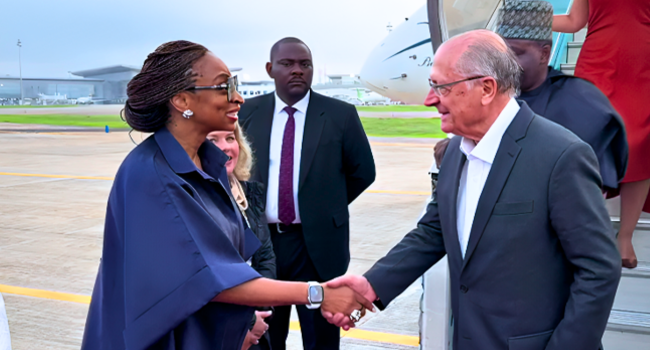
Ola Akinwunmi
Brazil’s Vice President, Geraldo Alckmin, arrived in Nigeria on Tuesday alongside his wife, Maria Alckmin, marking the start of a high-level diplomatic engagement aimed at deepening bilateral relations between the two nations.
The visit signals the beginning of the second session of the Nigeria-Brazil Strategic Dialogue Mechanism — a platform designed to strengthen cooperation on shared development priorities, particularly within the framework of South-South collaboration.
Alckmin was received at the Presidential Wing of the Nnamdi Azikiwe International Airport by top Nigerian officials, including the Deputy Chief of Staff to the President, Senator Ibrahim Hadejia, and the Minister of Industry, Trade and Investment, Dr. Jumoke Oduwole. Other dignitaries present included the Minister of Livestock Development, Idi Maiha, and the Minister of Agriculture and Food Security, Senator Abubakar Kyari.
The visit is expected to lead to significant breakthroughs, with over 30 Memoranda of Understanding set to be signed over the three-day summit. These agreements will cover a range of sectors, including defence, agricultural technology, energy, and cultural exchange programmes.
Speaking during a reception at the airport, Hadejia described the visit as “a pivotal moment in Nigeria’s Renewed Hope Agenda,” underscoring the strategic alignment between Brazil’s technical expertise and Nigeria’s national development goals.
“Brazil’s experience in agribusiness, energy transition, and industrial innovation offers real opportunities for collaboration,” Hadejia said. “This dialogue mechanism shows our commitment to partnerships that deliver meaningful progress for our people.”
The summit is also seen as a step forward in diversifying Nigeria’s global partnerships beyond traditional allies, reinforcing its commitment to building resilient South-South cooperation frameworks.
As the dialogue continues in Abuja, stakeholders from both countries will explore concrete initiatives that promise to shape the future of Nigeria-Brazil relations — with results expected to emerge not just in policy, but in practical outcomes for millions of citizens.
